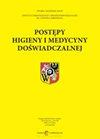硒和大肠相关的癌症或腺瘤
IF 0.3
4区 医学
Q4 MEDICINE, RESEARCH & EXPERIMENTAL
引用次数: 1
摘要
硒对结直肠癌或腺瘤的保护作用仍然是一个有争议的问题。尽管硒对癌症的生理保护机制已被充分描述,但1998年至2018年的研究结果尚不确定,需要在未来加以考虑。无论是观察性研究还是实验性研究都没有得出一致的结果。尽管Cochrane综述显示,精心设计的随机临床试验(RCT)表明补硒对癌症发病率没有有益影响,但在受试者相关文献中发现,精心设计了的随机临床研究证实了补硒对结直肠腺瘤或结直肠息肉复发的保护作用。在综述的研究中,硒浓度是在血清/脚趾甲或饮食中测量的。需要强调的是,血液中硒的浓度取决于食物中这种微量营养素的浓度,而这种浓度又取决于土壤中的硒含量、不同地理区域不同的硒的生物利用度以及硒的形式。硒作为硒蛋白的一种成分在血液中循环,参与氧化还原,从而降低患癌症的风险。尽管有这种众所周知的防止癌症发生的保护机制,但有一半的综述研究没有证实硒的保护特性。总之,目前关于硒与结直肠癌癌症或腺瘤之间关系的知识状况不仅揭示了研究的不确定结果,而且还表明,由于这项研究有限,有必要进行更多的前瞻性研究,重点关注补硒和结直肠癌癌症。本文章由计算机程序翻译,如有差异,请以英文原文为准。
Selenium and cancer or adenoma related to the large bowel
Summary The protective effect of selenium against colorectal cancer or adenoma is still a controversial issue. Although there are well-described (pato)physiological protective mechanisms of selenium against colorectal cancer, the results of the studies from 1998–2018 are inconclusive and need to be considered in the future. Neither observational nor experimental studies present consistent results. Although the Cochrane review showed that well-designed randomized clinical trials (RCTs) presented no beneficial effect of selenium supplementation on cancer incidence, well-designed RCTs confirming the protective effect of selenium supplementation against colorectal adenoma or colorectal polyp recurrence have been found in subject-related literature. In the reviewed studies, selenium concentration was measured in the blood serum/toenail or in diet. It is of great importance to highlight that blood selenium concentration depends on the concentration of this micronutrient in food, which in turn depends on selenium content in soil, bioavailability of selenium, which is different in various geographical regions, and forms of selenium. Selenium circulating in blood as a component of selenoproteins participates in oxidoreduction, thus reducing the risk of developing colorectal cancer. Despite this well-known protective mechanism against colorectal cancer occurrence, half of the reviewed studies did not confirm the protective properties of selenium. To sum up, the current state of knowledge on the association between selenium and colorectal cancer or adenoma has revealed not only inconclusive results of the studies, but has also shown that there is a need to conduct more prospective studies focused on selenium supplementation and colorectal cancer as this research is limited.
求助全文
通过发布文献求助,成功后即可免费获取论文全文。
去求助
来源期刊

Postȩpy higieny i medycyny doświadczalnej
MEDICINE, RESEARCH & EXPERIMENTAL-
CiteScore
0.60
自引率
0.00%
发文量
50
审稿时长
4-8 weeks
期刊介绍:
Advances in Hygiene and Experimental Medicine (PHMD) is a scientific journal affiliated with the Institute of Immunology and Experimental Therapy by the Polish Academy of Sciences in Wrocław. The journal publishes articles from the field of experimental medicine and related sciences, with particular emphasis on immunology, oncology, cell biology, microbiology, and genetics. The journal publishes review and original works both in Polish and English. All journal publications are available via the Open Access formula in line with the principles of the Creative Commons licence.
 求助内容:
求助内容: 应助结果提醒方式:
应助结果提醒方式:


